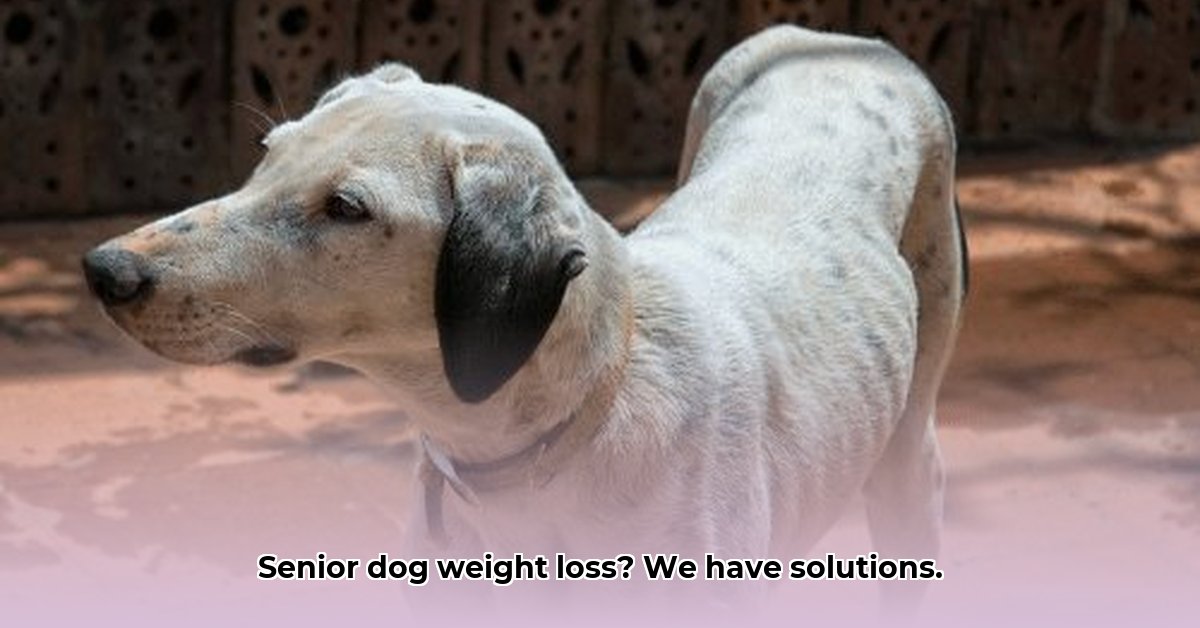
Seeing your older dog lose weight can be heartbreaking. Is it simply a natural part of aging, or is something more serious going on? This guide, developed in consultation with veterinary experts, explains why senior dogs lose weight—from decreased appetite to underlying health issues—and provides a practical plan to help your dog regain a healthy weight. We'll explore ways to identify the cause, implement effective solutions, and prevent further weight loss. Let's get your furry friend back to their happy, healthy self!
Understanding Senior Dog Weight Loss: More Than Just Age
Weight loss in senior dogs isn't always straightforward. While a decreased appetite and a naturally slowing metabolism are common with age, significant weight loss often signals an underlying health problem. Several factors can contribute:
- Age-Related Changes: As dogs age, their bodies become less efficient at absorbing nutrients and often have reduced appetite. Think of it like an older car needing more frequent maintenance.
- Dental Issues: Painful teeth or gums can make eating difficult and lead to reduced food intake.
- Infections: Infections, whether bacterial or parasitic, can cause weight loss by reducing appetite and increasing metabolic demands.
- Chronic Diseases: Conditions like kidney disease, diabetes, cancer, or heart disease can all contribute to weight loss.
- Changes in Activity Levels: A decrease in physical activity can also lead to weight loss, as the dog's energy needs are lower.
Spotting the Warning Signs: Beyond Visible Weight Loss
Don't rely solely on visual assessment. Regular weighing is crucial. A weight loss of approximately 10% over a few months is a significant red flag requiring immediate veterinary attention. Other warning signs include:
- Lethargy: Increased tiredness and reduced playfulness.
- Appetite Changes: Eating significantly less or more than usual.
- Thirst Changes: A dramatic increase or decrease in water consumption.
- Gastrointestinal Issues: Vomiting, diarrhea, or changes in bowel movements.
- Behavioral Changes: Withdrawal, decreased interest in favorite activities, or uncharacteristic behavior.
A Step-by-Step Approach to Addressing Senior Dog Weight Loss
If you suspect your senior dog is losing weight, follow these steps:
Schedule a Veterinary Appointment: This is the most critical step. Your veterinarian will conduct a thorough physical examination, possibly order blood tests or other diagnostics to identify underlying conditions, and develop a personalized plan.
Weekly Weigh-ins: Monitor your dog's weight weekly to track progress and identify any concerning changes.
Detailed Record-Keeping: Maintain a detailed log of your dog's eating habits, activity levels, bowel movements, and any behavioral changes. This valuable information aids your vet's diagnosis.
Dietary Adjustments: Your veterinarian may recommend a senior dog food formulated for easier digestion and higher caloric density. They might also suggest feeding smaller, more frequent meals.
Supplements (Under Veterinary Guidance): Never administer supplements without first consulting your veterinarian. They can determine if any supplements are necessary and safe for your dog's specific situation.
Nutrition for Senior Dogs: Choosing the Right Food
Selecting appropriate food is paramount. Senior dog food is specifically formulated to be easier to digest and contains higher calorie content than food for younger dogs. Look for options rich in protein and moderate in fat. However, avoid overfeeding. Remember, your dog's enjoyment of the food is also important. If your dog struggles to eat, consider warming their food slightly or adding a small amount of plain, low-sodium bone broth to enhance palatability.
Addressing Underlying Health Conditions
Often, weight loss in senior dogs is linked to underlying health issues. Early diagnosis is crucial to improving the outcome. The sooner you address the root cause, the better the chances of a successful recovery. Dr. Emily Carter, DVM, from the American Veterinary Medical Association, emphasizes the importance of “proactive veterinary care for senior dogs, as early detection of underlying illnesses allows for timely intervention and improved outcomes.”
Proactive Senior Dog Care: Prevention is Key
Regular veterinary checkups are essential for senior dogs. Consistent monitoring helps detect potential problems early, before they escalate. Proactive care can significantly extend your dog's comfortable and healthy years with you. Remember, even subtle behavioral shifts can be early warning signs.
Key Takeaways:
- A comprehensive veterinary examination is crucial to rule out underlying health issues.
- Gradual increases in high-quality calories, not just quantity, are essential.
- Prioritize improving both appetite and digestion.
- Regular weight monitoring allows for timely adjustments to the diet and prevents overfeeding.
- Consult with your veterinarian for personalized guidance and support.
This guide provides information, but it's not a substitute for professional veterinary advice. Your veterinarian is the best resource for your dog's health concerns. Don't hesitate to reach out—they are there to support both you and your beloved companion.